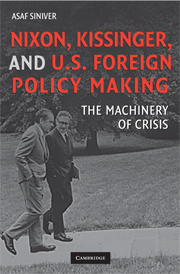Book contents
- Frontmatter
- Contents
- List of Figures
- Acknowledgments
- Abbreviations
- Dramatis Personae
- Nixon, Kissinger, and U.S. Foreign Policy Making
- Introduction
- 1 Structures, Processes, and Personalities in U.S. Foreign Policy
- 2 The Making of U.S. Foreign Policy During the Nixon-Kissinger Years
- 3 The Incursion into Cambodia, Spring 1970
- 4 The Jordanian Crisis, September 1970
- 5 The India-Pakistan War, December 1971
- 6 The Yom Kippur War, October 1973
- Conclusion
- Bibliography
- Index
- Plate section
Conclusion
Published online by Cambridge University Press: 17 August 2009
- Frontmatter
- Contents
- List of Figures
- Acknowledgments
- Abbreviations
- Dramatis Personae
- Nixon, Kissinger, and U.S. Foreign Policy Making
- Introduction
- 1 Structures, Processes, and Personalities in U.S. Foreign Policy
- 2 The Making of U.S. Foreign Policy During the Nixon-Kissinger Years
- 3 The Incursion into Cambodia, Spring 1970
- 4 The Jordanian Crisis, September 1970
- 5 The India-Pakistan War, December 1971
- 6 The Yom Kippur War, October 1973
- Conclusion
- Bibliography
- Index
- Plate section
Summary
The NSC system will not work unless the President makes it work. After all, this system was created to serve the President of the United States in ways of his choosing. By his actions, by his leadership, the President therefore determines the quality of its performance.
The Tower Commission, 1987The Tower Commission was appointed more than a decade after President Nixon had resigned from office. The individuals under its investigation and the nature of their operations had seemingly little in common with the Nixon-Kissinger system of foreign policy making. However, the observations and recommendations of the Tower Commission – appointed by President Reagan to investigate the rogue operations conducted by NSC staff during the Iran-Contra affair – transcend the immediate experience of the Reagan administration, or indeed any other specific case of presidential mismanagement of the NSC and the advisory system. The observations made here about the workings of the WSAG, and more broadly about the nature of the relationship among structures, processes, and personalities in U.S. foreign policy crisis decision-making, should serve as a reminder to future presidents that procedures are meant to serve purposes. They are not ends in themselves. An advisory group cannot determine the course of a crisis, nor can it shape its outcome. It requires presidential guidance and leadership, and when the leader is incapacitated due to emotional turbulence or physical exhaustion, it either fails to performs its tasks adequately or it must rely on an executive surrogate to fill in the vacuum of authority.
- Type
- Chapter
- Information
- Nixon, Kissinger, and US Foreign Policy MakingThe Machinery of Crisis, pp. 224 - 232Publisher: Cambridge University PressPrint publication year: 2008



